 Petzlover
PetzloverBull and Terrier is originated from United Kingdom but Kanni is originated from India. Bull and Terrier may grow 17 cm / 6 inches shorter than Kanni. Both Bull and Terrier and Kanni are of same weight. Both Bull and Terrier and Kanni has almost same life span. Both Bull and Terrier and Kanni has almost same litter size. Both Bull and Terrier and Kanni requires Low Maintenance.
The Bull and Terrier is a blend between a number of Old English Terriers and the Old English Bulldog. It is believed that this extinct dog was the start of breeds such as the American Pit Bull Terrier and the Staffordshire Bull Terrier.
They were excellent for hunting rats and weren’t a true breed. The dog was popular in the British Isles and in the United States in the 19th Century. They became rare as different varieties of Bull and Terrier were bred and standardized.
Most terriers have a good deal of Old English Bulldog blood in them so as to provide them with the courage to fight and hunt prey, while the English Terrier blood provided a feisty temperament and longer legs for speed.
Around 1860, the Bull and Terrier breed split into 2 categories – the pure white Bull Terrier and the ones of color. The Bull and Terrier was never recognized as a standardized breed by any of the kennel clubs.
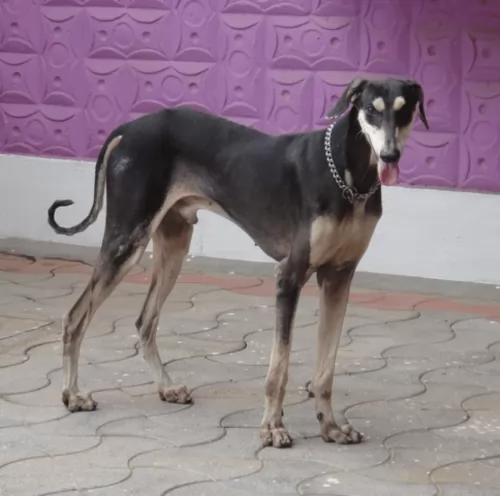 The Kanni dog is a rare South Indian Sighthound. It is also known as the Maiden's Beastmaster and this is because it is known to be protector and defender of its owner's property.
The Kanni dog is a rare South Indian Sighthound. It is also known as the Maiden's Beastmaster and this is because it is known to be protector and defender of its owner's property.
During ancient times, the dog was used for hunting but today it is essentially kept as a pet and it is registered with the Kennel Club of India.
There isn’t too much detail and information on the Bull and Terrier but we can be sure that with the cross between the Old English Bulldog and the Old English Terrier, he would have been a small to medium sized compact, muscular dog, standing roughly between 38cm to 50cm in height and weighing anything in the region of 11 to 22kg.
He would have had a big head, and most of the dogs had a medium to long tail. His coat was of many colors such as white, fawn, tan or brindle and would have been short and smooth.
As far as temperament goes, the Bull and Terrier would certainly be courageous, feisty, independent, strong and energetic. Socialization wasn’t available in those days but with training, this intelligent breed would be affectionate with his human family.
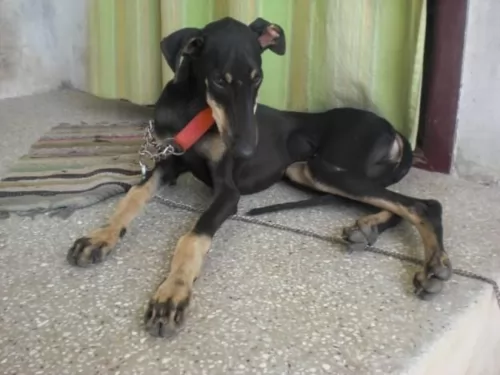 These dogs are tall, slim and deep chested, coming in two-color combinations, but it is the black and tan variety that is the true Kanni. There is also a cream variety. There are other color variations and each color has a unique name connected to it. The coat of the Kanni is short and smooth.
These dogs are tall, slim and deep chested, coming in two-color combinations, but it is the black and tan variety that is the true Kanni. There is also a cream variety. There are other color variations and each color has a unique name connected to it. The coat of the Kanni is short and smooth.
They are medium sized dogs standing at 62 to 67cm at the withers and weighing in the region of 18 – 22kg. When you first look at these dogs you might think of them as being similar to a Greyhound in looks. This is also because of their lean, muscular looks.
The eyes are a golden color, the nose black and the ears are a medium size and floppy with the long tail being semi-curved.
The Kanni has always been a hunting dog so he is used to being sharp, strong-willed, independent and alert as well as having some aggressive tendencies. It is also quite a reserved dog but he shows love and loyalty to his owner. He is independent and easy to train. It is a good thing to have him trained and socialized so that he is obedient to the simple commands you give him.
Nobody seems to be 100% sure when the classic Bull and Terrier dog became extinct but it is strongly assumed that it was some time between 1890 and 1920.
People believe that there are actually surviving breeds that could be considered Bull and Terriers. One thing is sure, when you consider that the Bull and Terrier is actually made up of several breeds such as the Bull Terrier, the Staffordshire Bull Terrier, Boston Terrier and American Pit Bull Terrier then you can imagine the character of the dog – brave, hardy, intelligent, feisty, bold, confident and fearless. He was a dog who loved his human family and would have been both friend and protector.
These dogs have been popular around the world, and have had a strong influence in the development of a number of other breeds. Even today, breeders are always looking at ways to develop new breeds based on the descendants of the Bull and Terrier.
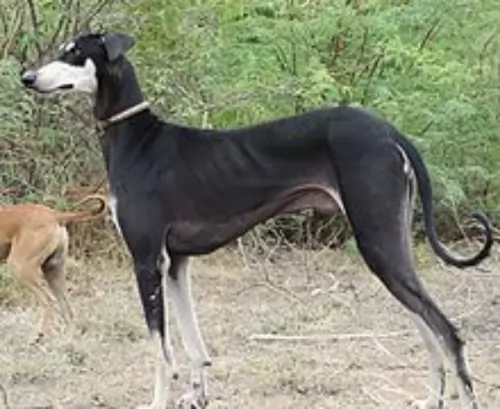 The Kanni looks much like your regular Doberman Pinscher but he has long tail and floppy ears. He is slim and agile but also powerful being able to have bursts of speed. It is why he requires a large place to run and play in, being better suited to a home with a large garden or farm.
The Kanni looks much like your regular Doberman Pinscher but he has long tail and floppy ears. He is slim and agile but also powerful being able to have bursts of speed. It is why he requires a large place to run and play in, being better suited to a home with a large garden or farm.
He is a playful, quiet dog but he has quite a bark on him and is known to be a good watchdog because of this. He is a protective dog too, devoted and loyal and making a splendid family pet.
The Bull and Terrier was no doubt a robust breed with few health issues. However his owners of that time would have had to be aware of eye diseases such as cataracts that could have lead to blindness.
Other health issues they would have had to contend with would have been hip and elbow dysplasia, a disease which can cause lameness in a dog accompanied with pain. Because the Bull and terrier was mixed with the English Bulldog, the dog owners would have had to be aware of respiratory health problems, as the Bull dog is a breed that is susceptible to these problems.
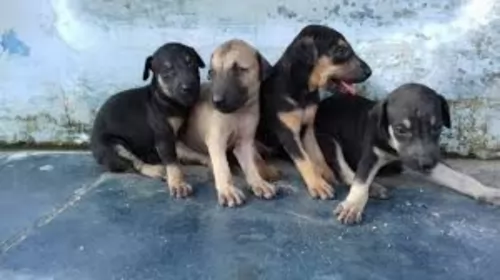 Not much is known about inherited health problems in this breed, and he can live up to a ripe old age of 16. It seems a pretty healthy dog, but still it helps to be aware of some of the more common dog illnesses that your pet can succumb to.
Not much is known about inherited health problems in this breed, and he can live up to a ripe old age of 16. It seems a pretty healthy dog, but still it helps to be aware of some of the more common dog illnesses that your pet can succumb to.
For first time dog owners it can be difficult knowing what health problems our beloved pets could suffer from. Every dog breed has certain diseases to which they are more prone to, but these are some common issues that most of our 4-legged friends will face -
This is a common dog health problem in India with the Kanni. There are so many things that disagree with their digestion. Most dogs may not want to eat their next meal, but when he is lethargic, he is hot and is vomiting, it is time to get your pet to the vet. This is because diarrhea causes rapid dehydration in dogs. To avoid diarrhea, steer clear of certain foods such as milk and dairy products as well as old, spoiled fatty foods. With diarrhea your dog must always have access to fresh, cool water.
This is a common dog disease, and ear infections can be painful and frustrating for your pet. He’ll scratch at his ear, shake his head and the inside of the ear may be red with a discharge. Check his ears for redness and try to keep them free from wax build up and dust.
Cleaning the ear is quite simple, and if you’re not sure how, the vet can do it quickly and effectively. Usually some dog ear cleaning solution on some cotton wool can do the trick. Ear infections are common in dogs like the Kanni with floppy ears.
It is essential to control fleas on your dog from word go. Fleas thrive in warm temperature and humidity and your pet will scratch, bite and lick at the spot. When you brush your pet, look through his fur for fleas and tell you vet about it if you discover ticks and fleas. A topical ointment could nip the problem in the bud. You may want to consider a flea collar for your pet.
Tapeworms, hookworms and roundworms for instance are commonly found in dogs, and even for healthy dogs, deworming tablets should be given from time to time. If your dog has worms, you’ll notice lethargy, loss of appetite, diarrhea and vomiting. It may be time to get your pet to the vet.
Long ago the Bull and Terrier was developed to be a hunting dog, and because he was a blend of the English Bulldog and Terriers such as the Staffordshire Bull Terrier and English Terrier, he no doubt had a short coat that would have required being brushed down from time to time.
The Bull and Terrier dog was bred for hunting, and he would have in all likelihood have caught some of his own food. He would therefore have got a lot of protein in. His owners would also have fed him some of their own food too which would have been eggs, home-made bread, rice, fresh vegetables and meat.
He would have had a good quota of raw meat in his diet too and this would have ensured that his coat was shiny and glossy, free of rashes. Dogs such as the Bull and Terrier wouldn’t have eaten commercially produced kibble as that was only introduced in the 1930s.
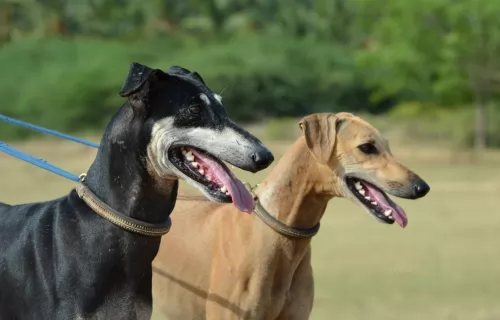 The Kanni is a low maintenance dog with his short coat. You can give him a good brush twice a week, check that his nails don't grow too long and also check his ears inside and out. Ticks and fleas are rife in hot weather and you want to give your dog a thorough check for these. You should also be checking your dog's teeth and brushing them 2 or 3 times a week. Dental problems can cause havoc with your dog's health.
The Kanni is a low maintenance dog with his short coat. You can give him a good brush twice a week, check that his nails don't grow too long and also check his ears inside and out. Ticks and fleas are rife in hot weather and you want to give your dog a thorough check for these. You should also be checking your dog's teeth and brushing them 2 or 3 times a week. Dental problems can cause havoc with your dog's health.
As a hunting breed, the Kanni is used to running so his needs for a good amount of exercise are quite high. While they do make good family pets, they hanker after wide open spaces and being busy. If you own one of these dogs, make sure that you exercise him often because otherwise he becomes frustrated and unhappy.
This dog has always been used to village life where he is free to roam wide open spaces. He is much more suited to country life than to city life, and as a pet, you will need to ensure that he receives a good amount of exercise.
Take him for walks, and if he's been socialized and trained, take him to the park and allow him off his leash to run.
The dog has always been fed traditional food such as porridge and milk but we know better now that dogs need protein too as well as a diet rich in vitamins and minerals to ensure his health.
You can feed him a top quality commercially manufactured dog food and add in some cooked chicken, rice and vegetables from time to time. It is expensive, but if you can, try and add in some raw meat occasionally as well. Your Kanni dog must always have access to fresh, clean water.